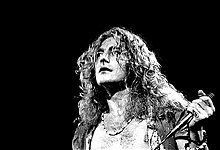Unlike their contemporaries in Jethro Tull and Yes, who use "the physical compulsion of beat and volume to involve the mind", Led Zeppelin "make body music of an oddly cerebral cast, arousing aggression rather than sexuality." As such, along with other second-generation English hard rock bands like Black Sabbath and Mott the Hoople, they can attract both intellectuals and working-class youths in "a strange potential double audience." Years later, In Through the Out Door's "tuneful synthesizer pomp" further confirmed for Christgau they were an art rock band.
Page stated that he wanted Led Zeppelin to produce music that had "light and shade". This began to be more clearly realised beginning with Led Zeppelin III, which made greater use of acoustic instruments. This approach has been seen as exemplified in the fourth album, particularly on "Stairway to Heaven", which begins with acoustic guitar and recorder and ends with drums and heavy electric sounds. Towards the end of their recording career, they moved to a more mellow and progressive sound, dominated by Jones' keyboard motifs. They also increasingly made use of various layering and production techniques, including multi-tracking and overdubbed guitar parts. Their emphasis on the sense of dynamics and ensemble arrangement has been seen as producing an individualistic style that transcends any single music genre. Ian Peddie argues that they were "... loud, powerful and often heavy, but their music was also humorous, self-reflective and extremely subtle".
Legacy
Many have considered Led Zeppelin to be one of the most successful, innovative, and influential bands in the history of rock music. Rock critic Mikal Gilmore said, "Led Zeppelin—talented, complex, grasping, beautiful and dangerous—made one of the most enduring bodies of composition and performance in twentieth-century music, despite everything they had to overpower, including themselves".

Niciun comentariu:
Trimiteți un comentariu